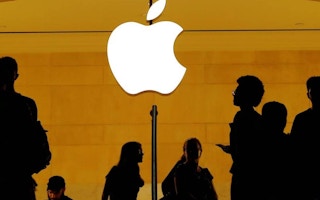Technology giant Apple won an international award on Wednesday for making details of its supply chains public in a bid to boost transparency and help end modern slavery.
Since 2012 Apple says it has reduced the number of underage workers in its extended supply chain, which includes locations where rare earth minerals are mined for use in smartphones.
Labour rights groups had previously criticised Apple and its biggest manufacturing partner Foxconn for excessive overtime, hiring underage workers and failing to provide health insurance.
“One of the deepest commitments that Apple has a company is to leave the world better than we found it,” Angela Ahrendts, head of retail at Apple, said during Trust Conference in London, which is hosted by the Thomson Reuters Foundation.
“As a company whose work touches the lives of so many people, we feel we have an enormous responsibility, and an enormous opportunity, to turn our values into action,” she said, receiving the prize designed by British sculptor Anish Kapoor.
The Thomson Reuters Foundation Stop Slavery Award recognises efforts by companies to identify, investigate and eradicate forced labour from their supply chains.
Consumer goods giant Unilever was the other winner of the annual award, while financial services firm Standard Chartered and Thailand-based seafood producer Thai Union were highly commended for their work.
More than 40 million people are estimated to be trapped as slaves in forced labour and forced marriages, most of them women and girls, according to the International Labour Organisation (ILO) and rights group Walk Free Foundation.
Nearly 25 million work in factories, on construction sites, farms, fishing boats and as domestic or sex workers, says ILO.
With slavery now considered a major global issue, there is growing scrutiny on initiatives to meet a UN goal to end by 2030 a trade estimated to raise annual illicit gains of $150 billion for traffickers.
Businesses are under increased pressure from both governments and consumers to disclose what actions they are taking to ensure their supply chains are free from slavery.
The world’s largest canned tuna company, Thai Union Group PCL, has also pledged to tackle potential labour abuse and overfishing, seeking to clean up the Thai seafood industry.
Thailand’s multibillion-dollar seafood sector has come under fire in recent years after investigations showed widespread slavery, trafficking and violence on fishing boats and in onshore food processing factories.
The company said in 2016 it would eliminate recruitment fees for its workers to prevent labourers from racking up debts to job brokers and from being exploited and abused.
The Stop Slavery Award was won last year by sports giant German sportswear giant Adidas, global fashion retailer C&A, US technology company Intel, and British retail and services group The Co-operative Group.
This story was published with permission from Thomson Reuters Foundation, the charitable arm of Thomson Reuters that covers humanitarian issues, conflicts, land and property rights, modern slavery and human trafficking, gender equality, climate change and resilience. Visit http://news.trust.org to see more stories.










